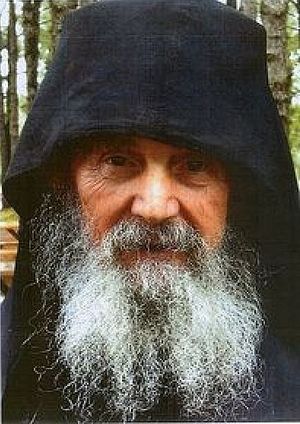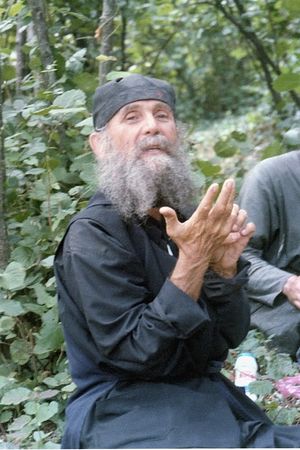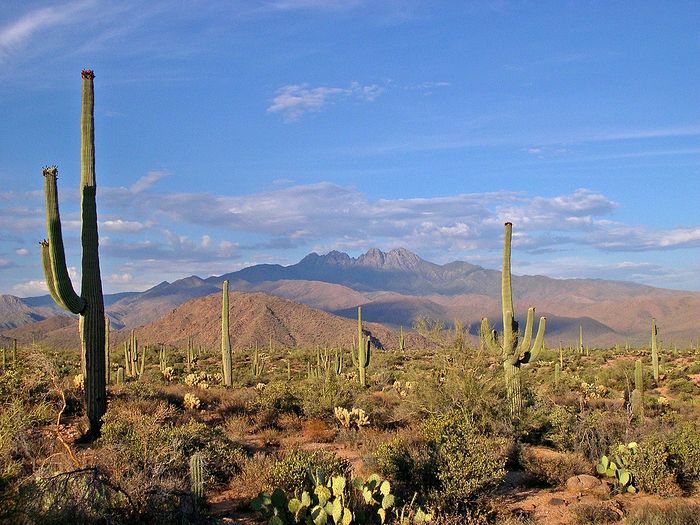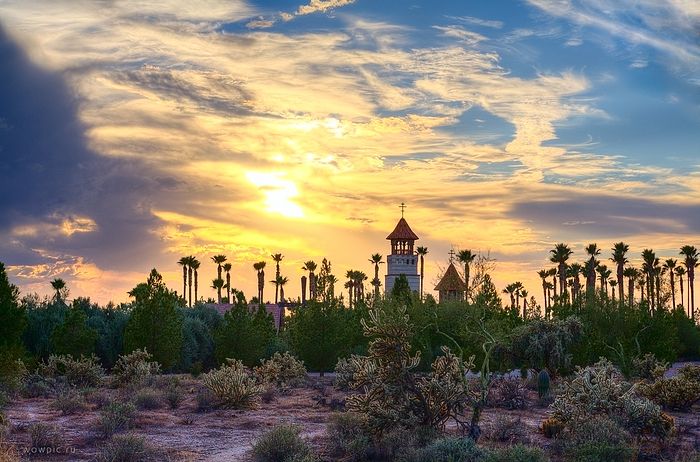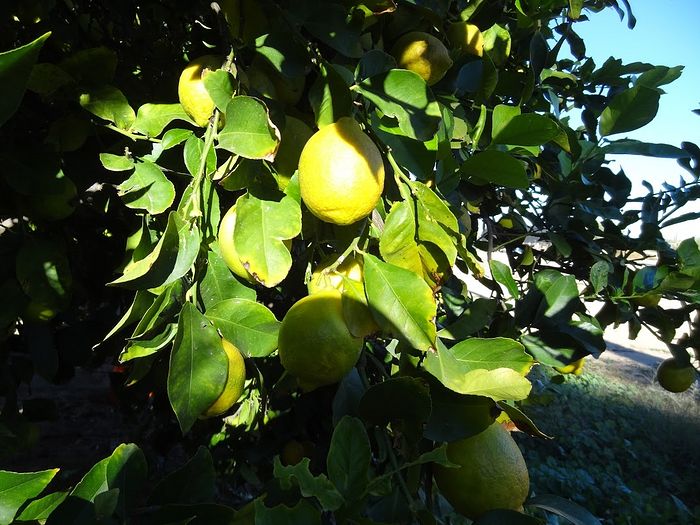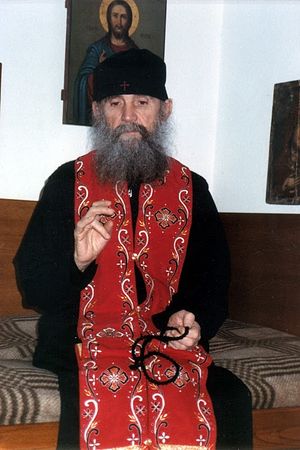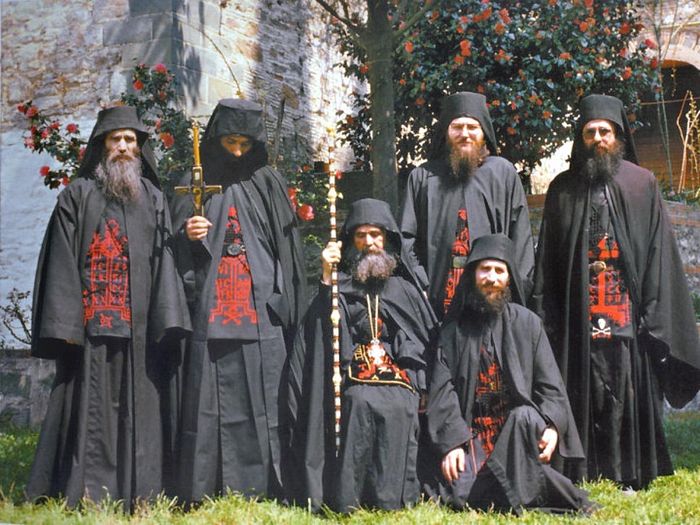 Elder Ephraim with monastery brethren
Elder Ephraim with monastery brethrenPeople of God
My journey began long before I walked down the ramp of the oldest airline company, “Royal Dutch Airlines,” founded in 1919, onto American soil.
Since November 2014 we have been working, with the blessing of Vladyka, then still an archimandrite, Tikhon (Shevukonv), on the small-format booklet series “People of God,” on modern saints and ascetics of piety. Vladyka thought of the project himself and of formatting this supply of fascinating material in the shape of a modern paterikon. Vladyka Tikhon himself edited the first two books in the series, on the great elders Paisios the Athonite and Archimandrite John (Krestiankin). Some of the ascetics, about whom it was proposed to publish, were already glorified as saints, while the canonization of others remained only a question of time and the determination of God. When we worked on the first paterikon on Paisios the Athonite the elder was not yet glorified, but when the book was released from the publishing house, Venerable Paisios was already canonized and as if blessed our subsequent work on the series “People of God.”
I think many are familiar with the spiritual experience of when reading or hearing stories of the saints or ascetics of piety, feeling their invisible presence, their prayerful help. Gathering material for the books, I felt the saints are near. Temptations, internal and external, were intensified: people were angry with me for no special reason; my own passions, which I thought had abated, raised their heads.
Books on the elders Gabriel (Urgebadze), Zosima (Sokur), Nikolai Guryanov, Paul (Gruzdev), and other elders and saints have been published—more than twenty books.
We also prepared a book on the great Elder Joseph the Hesychast for publication in this “People of God” series. Having great love for this elder, with fervent zeal I gathered material on a few of his spiritual children who themselves became elders: Hieroschemamonk Ephraim of Katounakia, Elder Arsenios the Hesychast and Cave-dweller and the still living and thriving Archimandrite Ephraim (Moraitis) of Philotheou.
Elder Ephraim was chosen as the abbot of Philotheou on Mt. Athos in 1973 and in short order revived the ascetic monastic life in the monastery, after which the Kinot of the Holy Mountain blessed him to expand and fill three other Athonite monasteries with those seeking the monastic life: Xeropotamou, Konstamonitou, and Karakallou. These monasteries are still under Archimandrite Ephraim’s spiritual guidance, as are also a number of men’s and women’s monasteries in Greece and North America.In 1960 the Greek Orthodox priest and theologian Archpriest John Romanides wrote: “The Holy Mountain should immediately send their representatives to America and found there monastic habitations, otherwise Orthodoxy on the American continent awaits its inevitable destruction.”
A few years later these prophetic words were embodied in life by the efforts of just one person. Monasteries of Elder Ephraim appeared in many regions of America and Canada: New York, Texas, Florida, Washington, South Carolina, Pennsylvania, Illinois, California, Michigan, Montreal, and Toronto. Chief among them is the Monastery of St. Anthony the Great in Arizona, and therefore now the elder is often known as Ephraim of Arizona.
The saints are near
While working on the books about great Athonite elders the feeling of their nearness, their presence, and of spiritual connection with them, the feeling of heartfelt affection became so strong, so real, that I began to doubt: maybe it was womanly exaltation, my gender’s prelest? So many turn to the elders for prayerful help, so many spiritual children they have…
Is it possible that they knew even about me, sitting here at my old computer, in a small house on the outskirts of some provincial town? The autumn air smelled strongly of rotting leaves, early twilight was quickly creeping up, icy wet wind knocked on the door, but the artificial yellow light in the room couldn’t drive away the thick impenetrable fog outside the window. Thoughts of doubt and disbelief tempted, crowded, and crept into my soul.
And then the following thought visited my feebly-believing head: if such a spiritual connection truly exists, it can be verified in practice! I can mentally turn to Archimandrite Ephraim with any request. Never mind that the elder doesn’t know Russian or English and I don’t know Greek—as is known, there’s no obstacles to spiritual communion. If he answers me, it means this spiritual connection is real. I hastily swept aside all requests which could have been fulfilled by simple coincidence. I had to ask the elder about something I couldn’t do myself without his prayerful intercession. I thought of something! I said to the elder:“Dear elder! I so want to see you and receive your blessing! I so want to see St. Anthony’s Monastery, where you are now laboring with your spiritual children! For me to travel to America would be like flying into space… But I believe, if you pray, I will wind up at your monastery. And it would mean the spiritual connection is real.
The next morning, in the daylight, yesterday’s thoughts, doubts, and requests already seemed stupid, childish, and fantastic.
You won’t believe it, but within a month I was standing at the gates of St. Anthony’s Monastery in Arizona, mouth agape with surprise, looking around at the Sonora desert, right across from me the native inhabitants of these places—a twenty-three-foot-wide cactus. It was like a fairy tale. I probably looked quite ridiculous.
Flying across the ocean
My miraculous trip across the ocean happened in the following way. A day after my fervent requests, an American named Richard came to Optina Pustyn, being baptized there with the name Ambrose. We met at the monastery and became friends. I recorded a conversation with the newly-baptized, published on pravoslavie.ru, and now Richard-Ambrose, having come to visit me, behind a cup of tea laughed, saying:
“I’m a famous person in Russia now! I go to Moscow, visit Novodevichy Monastery, and they call me by name. I ask: “How do you know my name?!” They answer: “We read pravoslavie.ru, and saw your photo there!”
Ambrose is now my spiritual brother—we have the same Optina archimandrite for a spiritual father. My brother began to share with me his regrets, that he didn’t fulfill his spiritual father’s blessing—how to go to confession now? “Well, I’ll ask forgiveness and explain that I wasn’t able, that I’ll fulfill it next time…”
“Was it a difficult blessing?”
“Not very: they blessed me to visit St. Anthony’s Monastery, the one in Arizona in the Sonora desert. It’s not so far from my home state of South Carolina, but I wasn’t able to arrange it all, I had a lot of things to do, and didn’t go…”
I think you will understand why my heart began to pound at these words.
Ambrose didn’t come alone this time, but with a friend Michael. Michael is Russian and lives in America. Besides his legal degree from Russia he received a legal education from George Washington University in the US capital, is licensed and works successfully as a lawyer. He’s a very smart, faithful young man. He serves in the altar in an Orthodox church, regularly confessing and communing. We went to Shamordino together and swam in the holy springs. He read one of my books and liked it. He asked me:
“Olga, would you like to see Orthodox America?” “I want to want to, but what’s the use? For me, getting to America is like getting to the moon…”
My American friends laughed. And here, by the prayers of Elder Ephraim, with the help of Misha[1] and Ambrose I found out that the path to America is much closer and easier than to the moon.
Sonora Desert, Arizona
Ambrose and I landed in Arizona at the same time, him coming from South Carolina, a subtropic state of sabal palm trees and white-toothed smiles, and me from the capital Washington, one of the few pre-planned cities of America, where there is a great concentration of historical attractions, free museums, and gorgeous parks.
We met at the airport. Ambrose was holding a garment bag in one hand and with the other clutching a book to his chest he had taken with him on the plane. “Do you have this book? I really, really like it! I never read anything like it! Never! You have to read it if you haven’t!”
I know my spiritual brother does a lot of reading, has a PhD, and easily quotes various authors, beginning with the ancient Greek fathers of tragedy and drama. At Shamordino there is an elderly academic nun who, realizing Ambrose was an American, advised him to learn at least a little about Russia for his spiritual salvation. The tactful Richard-Ambrose just politely smiled in response, not telling the nun that one of his papers dealt with the role of Peter Arkadievich Stolypin in Russian history. So, Ambrose is quite bright, an intellectual. Therefore, for me, his enthusiastic review of the book is the best recommendation.
“Which book?”
He turned the book around and I saw depicted on the cover Archimandrite Nathaniel (Pospelov) of the Pskov Caves Monastery. He was reading “Everyday Saints.” I smiled at Ambrose.
 Ready for a trip into the desert
Ready for a trip into the desertMy American brother rented a car and we drove through the desert with gigantic many-armed saguaro cacti reaching up to fifty feet high and 150 years of age. I think we could say this huge, fat cactus probably remembers the nineteenth century… Its roots spread 100 feet out from its body. Saguaro flowers, delicate and beautiful, blossoming at night, are a state symbol of Arizona. Besides the saguaro, another fifty types of cacti grow in the Sonora.
Posters at a roadside café tout their usefulness. Apparently cactus stems are wholly edible; they can be baked and fried, a paste is made from the pulp, wine from the juice, jams and compotes from the fruits, and its tough wood is used for fuel and building material.
The Sonora is the hottest of the four American deserts, but now, in December, at night it’s only 77° F. I read a book on animals in the Sonora. I didn’t know if I would see any of them, but they sound very interesting: antelope squirrels, antelope rabbits, and prong-horned antelope, grasshopper mice, deer mice, ground squirrels, and also bat-eared foxes, coyotes, desert badgers… The dangerous desert predator, the puma, has become very rare and is disappearing from hunting. The Sonora lizards are the only poisonous lizards in the world. There are seven types of rattlesnakes, black tarantulas, yellow scorpions, and black widows—a female with a bite lethal for humans.
“Olga, do you want to go for a walk in the desert, see some more, maybe take a picture with a cactus?” “Later… Next time…”
Many of the inhabitants of the Sonora are used to leading a nocturnal lifestyle—it’s always cooler at night. During the day they hide out in burrows. But there are those of the day: animals often crossed our path, but whether they were coyotes or bat-eared foxes I don’t know. I was just glad they weren’t pumas. Unknown birds of this foreign continent flew in the sky.
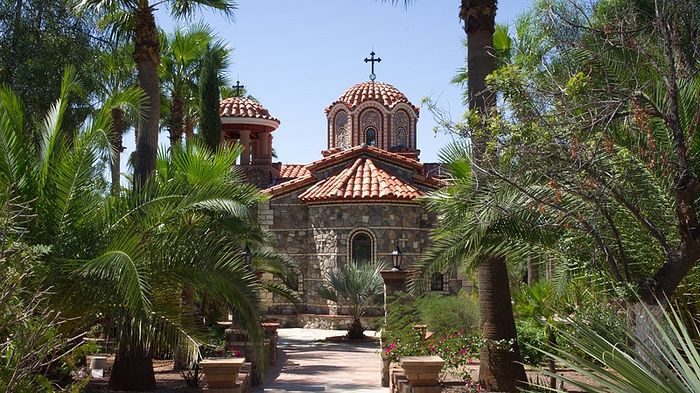 St. Anthony's Monastery
St. Anthony's MonasteryThe Monastery of St. Anthony the Great
We arrived at the monastery at six at night, in time only to look around. It got dark pretty quickly and I couldn’t see anything clearly. I only met a Russian hierodeacon, Seraphim, who’s been living in America since 1995 and in the monastery since 2002 with the obedience of working in the bookstore and meeting guests.
Stone paths, framed by multi-colored bricks, lead to the monastic cells and pilgrims’ guest houses. Men are forbidden to enter the women’s guest house. In my room of six bunks there were only two people, one American, the other Greek. The Greek woman didn’t speak English very well, but the three of us understood one another beautifully, got quickly acquainted, and spoke a bit about ourselves.
Quiet time began at 7 PM for rest before the night service, during which you cannot make noise, take a shower, or talk. Each bed has a nightstand with a lamp, and you can read during quiet time if you don’t want to sleep. There are a few chairs, some cabinets for clothes, and a bathroom with a shower. The cells are very cozy, with icons above the beds, and blinds always drawn on the windows. There’s an air conditioner and a fan. In the kitchen there’s a supply of potable water, you can brew tea and coffee, and there’s large containers of apple and orange juice in the fridge.
Monastery services
At midnight my roommates and I went to the service together. We went early to get a blessing from Archimandrite Ephraim and Abbot Paisios—the elder’s spiritual child who followed him from Mt. Athos.
We went up to the elders in order. Elder Ephraim used to give his blessing first, but now he stands behind Abbot Paisios and blesses second. The elder, eighty-seven years old, is gradually moving towards a more private, reclusive life. He already doesn’t go to the common meals with the brothers. The elder looks much younger than his years: short, of ascetic composition, gray beard, very kind eyes. Extraordinary feelings envelop you in his presence, but I won’t enlarge upon this, keeping in mind the words of the holy fathers: “To praise an ascetic monk is the same as to trip him.”
There’s no electricity in the church except for two small lights for the chanters. After the All-Night Vigil, at Liturgy, two monks from opposite sides light the candles on the chandelier. Then one of them, with a special stick with a hook on the end, with considerable effort pulls the large chandelier with burning three-foot candles, as far as the chains allow. Then the chandelier swings back and the chandelier begins to move in a pendulum motion. Then the monk takes the smaller chandelier hanging in the center of the larger one and swings it in the opposite direction of the larger one. It’s a little hard to describe, but when it begins to spin in the darkness of the church in all its radiant splendor—it leaves a remarkable impression. And it rotates on its own for a surprisingly long time—until the end of the service!
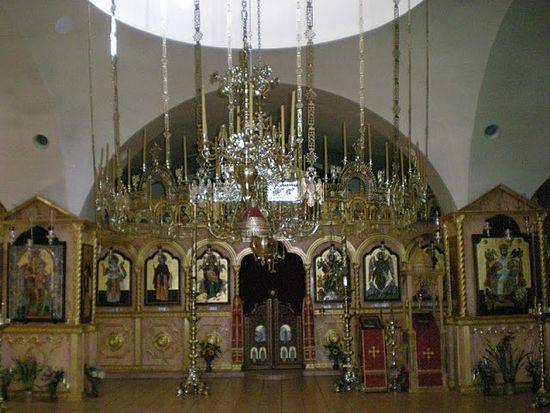 Inside the church of St. Anthony the Great
Inside the church of St. Anthony the GreatWomen stand strictly on the left side of the church, men on the right. No one tries to break this routine. During the singing of “Holy God, Holy Mighty, Holy Immortal…” in Liturgy, two monk-ecclesiarchs cense the church and believers according to Athonite tradition with hand censers—no chains, but a long handle with chiming bells. Choral singing is not used, except for the “Cherubic Hymn” and “It is Truly Meet.” One of the chanters on the kliros sings the melody in a particular voice while two others follow along with the root notes as an ison. It turns out quite beautifully. The Creed is not sung, but read by the abbot. Communicants don’t say their name as we do in the Russian Church, and having communed, wipe their own mouths with the cloth. They don’t kiss the chalice. There’s no zapivka,[2] just the handing out of antidoron. There are a few other differences, but they don’t strike the eye, and are noticeable only to the clergy and kliros.
I was standing in these amazing night services and thinking that women can’t go to Mt. Athos, so visiting the Monastery of St. Anthony the Great and the others founded by Elder Ephraim is a unique opportunity for women to feel the spirit of Athos. You’re touched by the prayers of the holy Athonite elder Joseph the Hesychast, through the prayers of his spiritual children who have themselves become great elders. This prayer and love can be felt anywhere on earth, even at a distance of a thousand miles. You pray in your mother tongue, and in some miraculous manner, by the grace of the Holy Spirit Who gave the apostles the gift of speaking in other tongues, the elder, having acquired this grace, understands you.
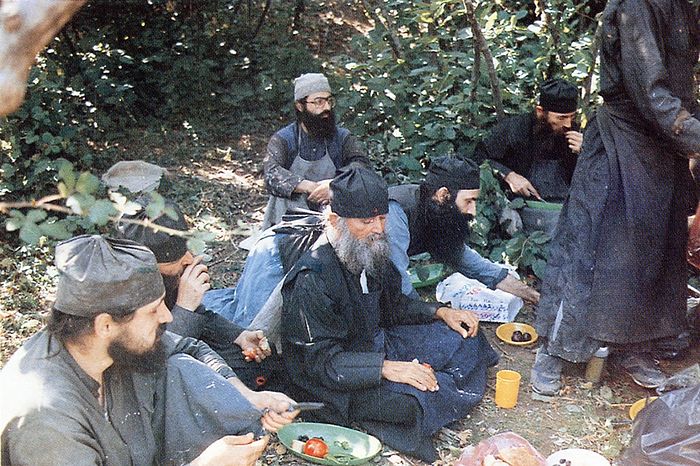
In a Greek church you can go up to the solea, which is not elevated, and venerate the icons. On the icons are several metal plates—on one, a hand, on another, a leg, an eye, a baby, another hand, a whole person. It’s a Greek tradition—having prayed for healing or the gift of children, and having received your request, you order these plates in gratitude.
Trapeza
After the service is trapeza. On weekdays the brethren have breakfast in their cells, the pilgrims in the trapeza, and they have lunch together. On feast days there’s a common breakfast. About forty-five brothers sit across from the abbot’s table, then the table for male pilgrims, and then further, the table for female pilgrims. Trapeza begins with the ringing of a bell. About ten minutes later there’s another bell, and you can pour yourself some cold water from a jug. The meal ends with the third ringing of the bell.
Today was a feast and we had festal dishes: mashed potatoes, fried fish, salad, olives from the monastery garden, and an apple on each plate, and bottles of apple cider vinegar and fresh olive oil. It was a festal trapeza. There was none of the typical Russian feast day fare: fish for the ascetics was already a big slackening from their daily menu. At the end of the meal they eat a piece of the Theotokion bread with a festal service, in order of seniority, pinching off a piece from the common loaf.
The next weekday at breakfast the brothers were gone. The pilgrims themselves pass by large plates and pots of food, serving themselves each what they want: nuts, halva, Turkish Delight, olives, salad, bread smeared with peanut butter, cups full of tea and caffeine-free coffee—you have to sleep after the night services!
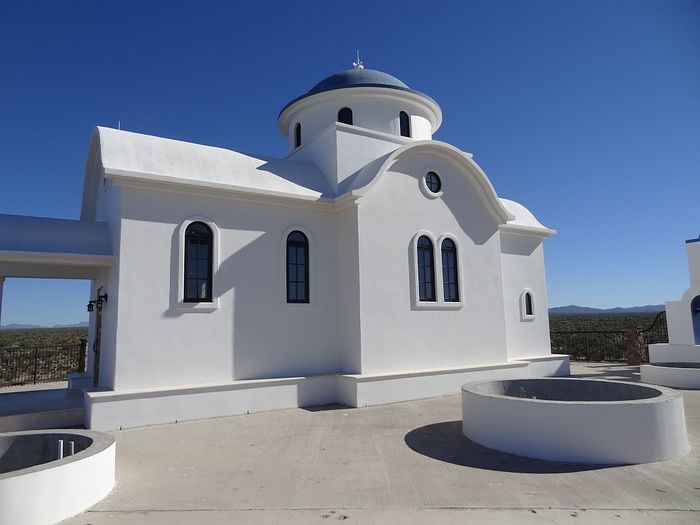 The church of the Prophet Elijah
The church of the Prophet ElijahMonastery and church surroundings
After sleeping a few hours after the service I quietly got up—my neighbors were still sleeping—and went to look around the monastery. Everything around was filled with the freshness and sunlight of the early morning. There are palms of several types, larches, pines, various cacti, multi-colored shrubbery—more than 2,000 types of plants providing shade and coolness, the sound of water in fountains decorated with stone lions and eagles. Flowers in flowerbeds, in stone vases, and usual ceramic pots gladden the eye. A bit farther, in the monastery garden are oranges, lemons, grapefruits, pistachio trees, and date palms. There’s a small vineyard and olive grove. A worker, gathering the citruses, gave me a couple of lemons.
I was struck by the beautiful churches, varying in size and style. The main church is named for St. Anthony the Great—the father of ancient monasticism—and St. Nektarios of Aegina—a highly venerated Greek saint having the grace to heal cancer. The icon of the Mother of God “of Arizona” was painted and sent from Greece for the cathedral. It is venerated as wonderworking. Its style is reminiscent of the well-known “Queen of All” icon.
Some distance from the monastery, on a hill is seen the snow white church of the Prophet Elijah, with blue cupolas. Fr. Seraphim gave me the key and a blessing to enter this remote church all alone. He suggested that I return to the guest house for a bottle of water. I didn’t want to return, which I ended up regretting, because we had to walk not far but in the heat, without any shade along the road, then up the steps to climb the mountain to the church.
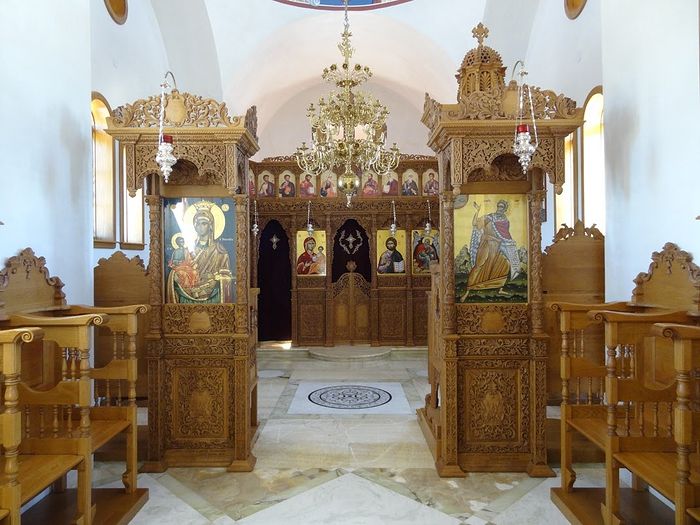 Inside the church of St. Elijah
Inside the church of St. ElijahI walked tentatively through the desert, timidly looking around, searching for rattlesnakes and scorpions. Having climbed the steps up the mountain, from which opened up a miraculous view of the surroundings, I calmed down and easily opened the massive door with the key. The church was cool, and a prayerful silence reigned. I prayed. I returned without any fear, admiring the unusual views of the vast desert. The only thing—I made a mistake and went the opposite direction of the monastery at the fork. How I managed to get lost in broad daylight I don’t know. Apparently I was affected by a few nights practically without sleep from the long flight and night service.
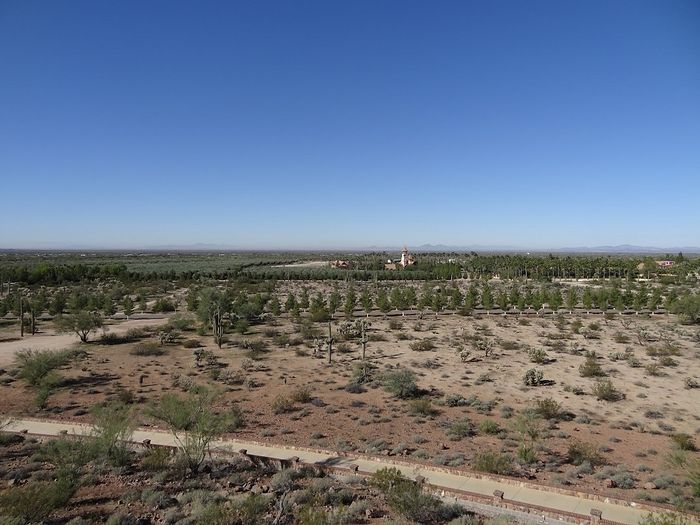 The view from St. Elijah's
The view from St. Elijah'sOn Elders Ephraim, Paisios, and Paul (Gruzdev) and oranges
After my short trip on my own into the desert Hierodeacon Seraphim introduced me to one of the few Russian families living not far from the monastery. Michael and Olga invited Ambrose and I over, and we drove down the deserted highway in search of their home. There were no cars, it was a complete wilderness—only a cactus—the silent guards of the surrounding area. Turning onto a country road, coyotes passed by our car. Finally into the desert, leaving the pavement behind, a sign appeared: “Dead end.”
The houses of those who moved near the monastery and exchanged the noisy attractions and benefits of city life for the desert are located at a considerable distance from one another, with only the Sonora between them in all its glory.
The owners greeted us joyfully.
—Hello, allow us to thank you for the invitation!
Olga: You know, we Russian families, living here, all read the site pravoslavie.ru. I’d like to take this opportunity to thank the creator and spiritual guide Vladyka Tikhon (Shevkunov). We know this site won’t let us down, that we won’t read anything confusing there, that would lead into temptation… You can feel the sobriety, spiritual discernment… And by the way, I know you by correspondence—I have your book Paths of Our Lives. You even signed it yourself for me!
—Me?!
Olga: Do you remember? After an excursion at Optina you signed my friend’s book and she asked you: “Sign another for my friends in Arizona, Olga and Michael.” We are those very same friends!
(“It’s truly a small world!” I thought.)
—How did you come to America?
Olga: I came as a programmer and wanted to get to know some advanced technology and to see how things were here in the West… I had no plans to stay here permanently. But the Lord was in control, and now I can work from home as a programmer—it’s a miracle, and not a small one.
Michael: And I’m a doctor. I worked here in a medical corporation which manufactures medical equipment. I met Olga in California almost as soon as I arrived. We got married here in America. We went to a Russian church in San Diego where we lived, and constantly prayed that the Lord would send us where we could be saved.
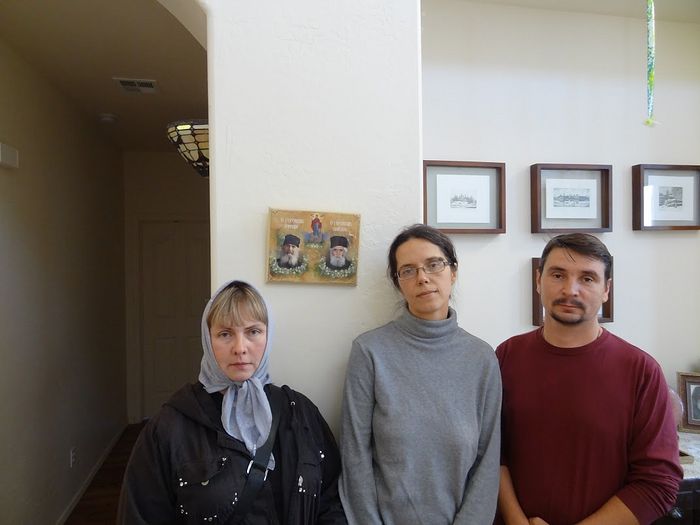 With Michael and Olga
With Michael and Olga—How did you end up here, in the Sonora desert?
Olga: You might be surprised, but I think I should start with my grandmother’s spiritual father, Fr. Paul (Gruzdev). My grandmother’s name was Vera, and she was from one of the places where Fr. Paul served. She was his spiritual child. The women that helped him were all my grandmother’s friends. He called them “My grandmas”… My mom confessed to him, and probably it was his prayers that impacted our lives. Look, we have a portrait of him there—they’re all Greeks, various elders, and Fr. Paul with them, for company’s sake (smiling).
He was supposed to baptize me in childhood, but it didn’t work out. My grandmother died early, in Bright Week, and I grew up unbaptized. But I really feel Fr. Paul’s care for me in my life. Grandma’s prayers and care are also present.
(As I was listening to Olga I felt my heart stop: a spiritual connection with holy people—is this not what called me across the ocean?)
Olga: Before her death my grandmother was lying in the hospital and my mom was in the bed next to her, to take care of her. Not long before she died Fr. Paul sent two oranges to her as a gift. Grandma couldn’t eat by this point, and mom didn’t want them, so they sat on the shelf for a long time. Mama would reminisce about how strange it was to see these bright orange oranges in a white hospital room. For a village hospital at that time fruit was unusual, an overseas thing.
When we moved here and began to plant orange trees, I remembered those very oranges. I want to believe that it was Fr. Paul’s prediction about the future… You know: “Events are the language by which the Lord God speaks to us”…
 Sonora Desert
Sonora Desert—You plant orange trees?
Michael: Yes, we have a big garden here… We planted them, they grew… This year was the first harvest. There are so many oranges! Arizona is like the orange state. You know, the most delicious and sweetest citrus grows in the desert.
Olga: There was a second sign that Fr. Paul gave us, that we wouldn’t be here without his prayers. A few pilgrims from Russia came to the monastery. One of them came to our house, saw the portraits of the elders and asked: “How did a portrait of Fr. Paul wind up here in Arizona?” It turns out she had been to see him, and considers him her spiritual father who greatly helped her to find the right way in life. “I,” she said, “asked his blessing to continue studying after institute, but he answered: ‘No. It’s not necessary. You will have a house, with cows walking and mooing around you.’ And, you know, his prophecy came completely true! She lives in her own house with cows all around! Although, they’re not her cows…”
Michael: There’s a few details to add: these cows walk through Swiss meadows—her husband is very rich and they live in Switzerland. And when Fr. Paul said this to her, she thought: “What cows?!” Such, you know, an educated woman…
Olga: We asked Fr. Paul to direct us in life, and he guides us, tells us the news… We lived in California for twelve years. At one point we really wanted to return to Russia, to the city of Rybinsk, where my parents live now. We started looking for a house there and were about to buy one. We had just enough money for a house. At the same time we started coming here, to St. Anthony’s. We liked the monastery but also wanted our homeland. On the day we were supposed to pay for our house in Rybinsk either the crisis happened in Russia, or our stock crashed… I already forgot…
Michael: The developers there stopped building and didn’t even want to return the money we’d already sent…
Olga: It was clearly the intervention of God’s providence. But when we were planning to come here, by the monastery, everything with buying the house went smoothly.
—In such a deserted place, where almost no one lives?
Michael: People live here—they just have big tracts of land… We have ten acres, and our neighbor has a hundred acres. Land here is sold in such chunks—it’s cheap. It’s desert here.
—But why so much land?
Michael (smiling): All the Russians ask this. If you pour the water from the well, everything will grow here: citruses, dates, figs, apples.
—And you like living here?
Michael: Of course! You know, it’s like living near Optina. It’s not for nothing that you live by Optina, right? Apparently something pulled you there? Maybe you felt some special grace? We’re the same. We’re nurtured here by the abbot Fr. Paisios.
—Maybe you can say something about your spiritual father and some of his teachings?
Olga: Fr. Paisios guides us by example. In the lives of the saints there’s a story of one elder-abbot. They asked him: “Father, why do you stand the whole time in church? You never even sit in your abbot’s chair?” The elder answered: “If I sit, my monks will lie down.” That’s how Fr. Paisios is: he shows us everything by his example. He labors alongside not just the older brethren, but even with the novices, not shunning any work. He speaks little but does much. He is very humble and tries to remain in the shadow of Elder Ephraim. He also helps the elder hear the pilgrims’ confessions. Usually Fr. Paisios receives Americans and Russians.
Michael: He is an ascetic. He doesn’t give particular instructions, but prays for his children, and we feel his prayer.
—Could you say a little about Elder Ephraim?
Michael: We haven’t been able to speak with Elder Ephraim very much—Elder Paisios is our spiritual father.
Olga: We have a Greek teacher now, who is a spiritual child of Elder Ephraim.
Michael: You know, when you go to Optina, you feel the spirit of the Optina elders there, even though the elders were there a century ago… and the Optina new martyrs—you feel their protection. St. Anthony’s Monastery is young, founded in 1995, but the continuity of eldership is here. Elder Joseph the Hesychast protects this monastery. The spirit of Elder Joseph the Hesychast and the Greek ascetics is here. And the rule here totally coincides with that of the Athonite monasteries where spiritual children of Elder Joseph became the abbots. So this rule has been verified by the experience of Athonite monasteries.
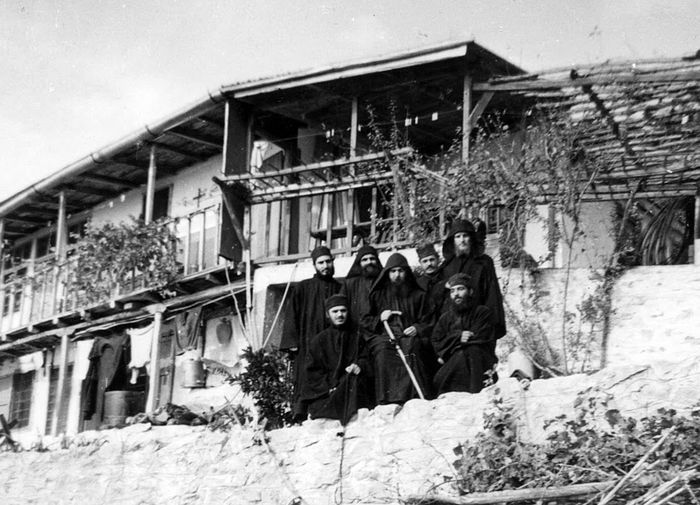 Elder Ephraim with his brotherhood
Elder Ephraim with his brotherhoodOlga: A priest from Greece, Fr. Stephen Anagnostopulous, came to the monastery not too long ago. He’s been a spiritual child of Elder Ephraim for many years and has written many books, one of which, Revelations During the Divine Liturgy, I strongly recommend you to read, although it’s only been published in Greek and English. He’s a Spirit-bearing father. The elder blessed him to have a conversation with the laypeople, and during this conversation he told us a little about the elder: “Once, many years ago, when the Elder was visiting me in Greece, many people gathered to listen to him, take his blessing, and ask him some questions. My wife set the table, but it so happened that we only had one loaf of bread, and we worried that it wouldn’t be enough for all our guests. Then the elder took the bread in his hands and began to break pieces off and give them to the guests. He kept doing it, and the loaf never ran out, until he had given everyone a piece. It was clearly a miracle that my family and I witnessed.”
Fr. Stephen then told us: “There are among you those who very much would like to see the living Christ, even with one eye to see Him as He walked with His Most Pure Feet on earth. I tell such people: go and look at Elder Ephraim, because to see the elder is the same as to see Christ, because Elder Ephraim has Christ in his heart.”
On Sundays after the service I go to talks for women led by one woman, Alexandra, who is also the elder’s spiritual child, with his blessing. Once, when the end of the conversation turned to the current lamentable state of the world, she said: “The elders (having in mind our elder, and also St. Paisios the Athonite who she had gone to see a few times) say that in our modern times it’s easy for the educated to be saved. The explanation is that the Lord always send His grace into the world. There used to be many ascetics who labored much to acquire grace. Now the number of those being saved has become quite small, and the quantity of grace, if I can say so, has remained the same. People willingly refuse the gifts of God, but grace doesn’t return back to the Lord. It’s like a bee looking for a flower in the meadow, and this excess of grace seeks a soul which prays and asks the Lord for some spiritual gifts. So, the elders say, today’s Christians, laboring a bit, can receive so much grace, and such gifts, for the sake of which the ancient ascetics had to labor for years.”
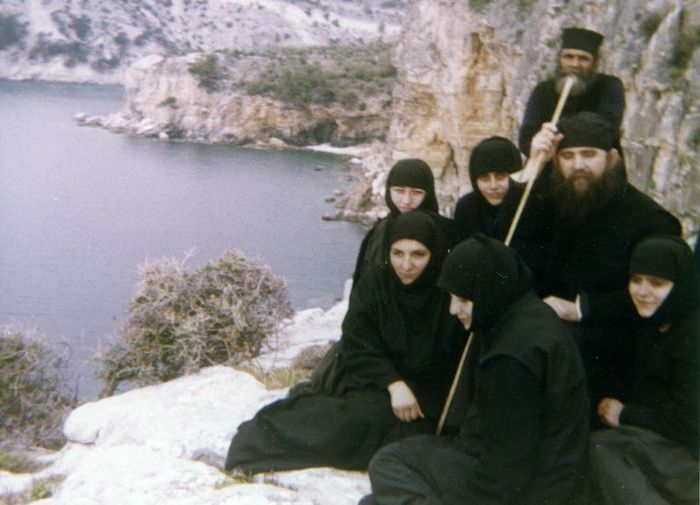 Elder Ephraim with his nuns
Elder Ephraim with his nuns—Thank you very much for the conversation!
Olga: In parting, I will tell you a parable of Elder Ephraim, which one Greek, Maria, his spiritual child, told us after the Saturday service. Elder Ephraim has a very vivid tongue. This is the story.
Elder Ephraim's story
Once there lived an ascetic monk (the elder did not say this story was about himself, but monks often speak about themselves in the third person). And once this ascetic, having many spiritual children, knocked for the Lord. The Lord opened to door for him, and the monk said:
“My Christ, I labor here with all my strength, I pray—can I ask of You one thing?”
“Ask,” answered the Lord.
“I have spiritual children, people with whom I’m connected. In the past, to enter the Heavenly Kingdom you had to score ten points. Ten out of ten. You had to labor quite hard. But times are so hard now that there’s no one around who can labor this way, to get ten out of ten… Can You make it so that those who get eight points would also be able to enter the Heavenly Kingdom?”
“Very well, for your sake, for the sake of your love for Me, so be it.”
The ascetic continued to pray and again knocked at the Lord:“My Christ, can I ask you another favor?”
“Ask,” the Lord answered again.
“You know, My Christ, even eight points is very hard to get. But people try. They try to obey, to pray. And what if only a few of them can score eight points? Make it, please, that those who get six points would also be able to enter the Heavenly Kingdom. After all, it would be a shame if a man tried all his life… But they’re so weak now… There are so many temptations in this world now and spiritual life is so low… Those who score six points—take them to Yourself as well!”
“Very well,” the Lord answered. “For the sake of your podvigs and love for Me, so be it.”
After a while the ascetic knocked a third time:
“Lord, and if they only score a four? Please, My Christ, I will labor for them, will keep vigil and labor even to the point of blood! Please, allow them also to see the Heavenly Kingdom!
“So be it,” uttered the Lord.
The monk looked around at the people, looked at all his spiritual children, thought, and again meekly approached the door. But when he was about to knock again, the Lord Himself opened the door and said to the ascetic:
“You know, all the same, they themselves have to try and make some effort!



